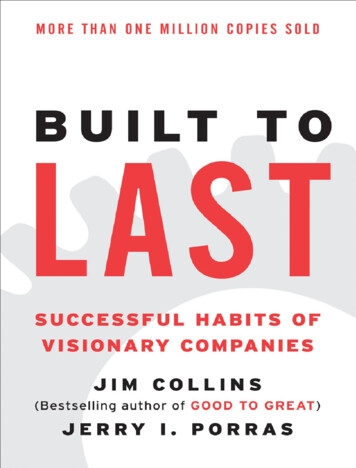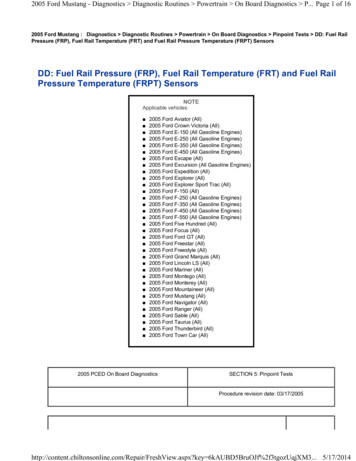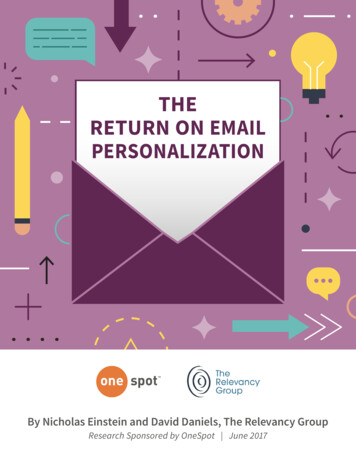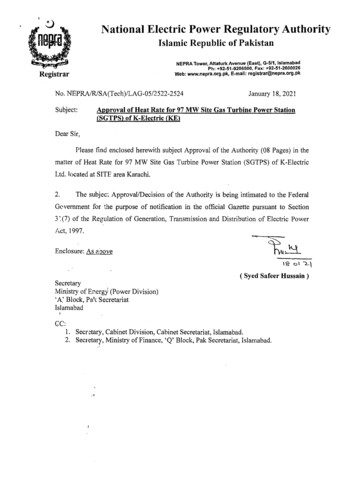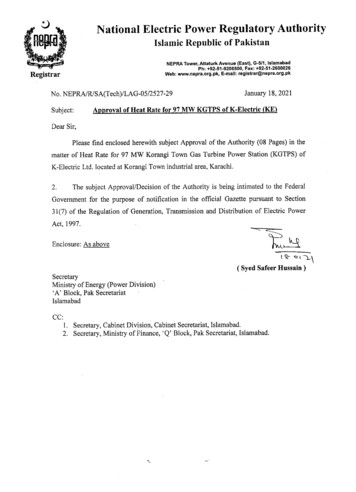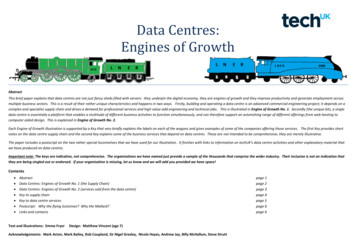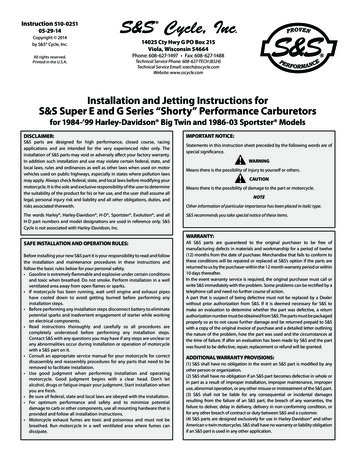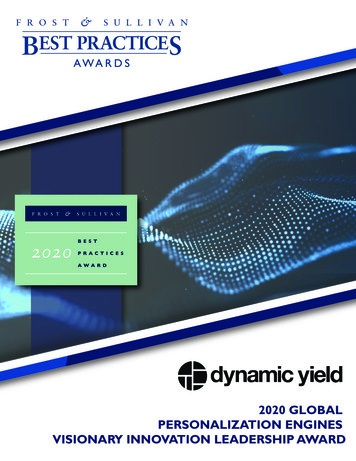
Transcription
2020 GLOBALPERSONALIZATION ENGINESVISIONARY INNOVATION LEADERSHIP AWARD
BEST PRACTICES RESEARCHContentsBackground and Company Performance . 3Industry Challenges. 3Focus on the Future and Best Practices Implementation. 4Conclusion . 9Significance of Visionary Innovation Leadership . 10Understanding Visionary Innovation Leadership . 10Key Benchmarking Criteria . 11Best Practices Award Analysis . 11Decision Support Scorecard . 11Focus on the Future. 12Best Practices Implementation . 12Decision Support Matrix . 13Best Practices Recognition: 10 Steps to Researching, Identifying, and Recognizing BestPractices . 14The Intersection between 360-Degree Research and Best Practices Awards . 15Research Methodology . 15About Frost & Sullivan . 15 Frost & Sullivan 20202“We Accelerate Growth”
BEST PRACTICES RESEARCHBackground and Company PerformanceIndustry ChallengesThe world is in the midst of the most significant technology transition ever seen as businessand society embrace the new digital reality. To a large extent, the shift is being driven bythe Internet economy, with consumer technology bellwethers including Alibaba, Amazon,Apple, Baidu, Facebook, Google, Microsoft, and Tencent redefining user and customerexpectations.Frost & Sullivan has been tracking how retail – the archetypal customer-facing industry – isat the cutting edge of this transformation, much of which has been driven by applications ofartificial intelligence (AI). Other customer-facing industries such as travel, hospitality, andretail banking are nicely following suit. AI has been enabling automated decision-makingwith accuracy and speed for some time now, based on data analytics coupled with selflearning abilities.Brands are vying for attention, aiming to deliver a positive experience and to build ameaningful connection with the customer that goes beyond transactional shoppinginteraction. Developments such as Facebook’s newsfeed change the world from informationpull to information push; the principal challenge for brands has become the need to standout from the continuously growing volume of content being generated. Frost & Sullivanpoints out that only the most relevant and noteworthy content will have a chance to elicit aresponse, as the volume of data being generated has exceeded the human ability toconsume data. Not only is algorithmic filtering increasing, but the attention spans ofyounger generations are declining.Too much information or product choice can confuse shoppers. Ensuing friction andcomplexity can lead to lost sales and affect the customer experience to the extent that itprevents customers from coming back. The challenge is to select and curate the best andmost relevant products. This is why personalization is so fundamentally valuable toconsumers and, by extension, to merchants – it prevents shoppers from being overwhelmedby the choices available to them. Digital retailers are personalizing their communications,recommendations, promotions, and digital storefronts/websites to tie in with shopperpreferences, habits, and purchase patterns. Looking ahead, innovative retailers will beraising customer expectations of physical shopping environments to the same level.Frost & Sullivan recognizes how personalization is becoming increasingly critical.Fundamentally, AI software creates customer profiles that can enable personalizedmarketing, promotions, and interaction – the profiles are also informed by customerlocation, in-store behavior, sentiment, and multichannel experience. This arena has beenattracting increasing attention and investment in recent years. It has seen the emergence ofa flurry of new, specialized providers that are bringing forth best-of-breed solutions. Frost &Sullivan observes how more and more established vendors of personalization technologyhave scrambled to upgrade their marketing solution portfolios in adjacent categories byadding personalization capabilities, notably those with robust data management offerings;indeed, the customer data platform (CDP) space is establishing itself as a fast-growingstandalone solution category. Moreover, technology providers with their core business inadjacent marketing technology categories (such as marketing automation) are upping theirpersonalization game. Frost & Sullivan 20203“We Accelerate Growth”
BEST PRACTICES RESEARCHThe tension between personalization and privacy will require increased attention. Retailersneed to tread carefully – consumers are concerned about retailers knowing too much aboutthem, and about the safety of their data. Frost & Sullivan analysts concludes thatincreasingly sophisticated personalization engines can help cope better with many of thesechallenges.Focus on the Future and Best Practices ImplementationNew York-based Dynamic Yield has its roots in Israel and was originally founded in Tel Avivin 2011. It focuses on personalization technology that helps businesses to improve theircustomer interactions, marketing effectiveness, and customer experience.Making Every Customer a VIP Through Personalization at ScaleDynamic Yield’s personalization engine uses machine learning (ML) and predictivealgorithms to define customer segments in real-time and enable immediate action. It allows(omnichannel) personalization, recommendations, automatic optimization, and one-to-onemessages across Web, mobile, email, dynamic advertising, as well as across IoT devicesand emerging channels, including kiosks, clienteling apps, in-store touchscreens, and more.The ultimate goal is to optimize the customer experience and help brands become morerelevant.The company considers itself to be distinctly positioned due to its strengths across amultitude of operational capabilities. These include its agility for experimentation andtesting, scalability, and its ability to provide a complete personalization technologytoolkit/suite (as opposed to a patchwork of point-solutions) across all touchpoints of thecustomer journey. Dynamic Yield enables automated, machine learning-drivenaugmentation of static content by adding personalized elements such as banners,recommendations, promotions, and buttons. It also helps its customers personalize websitesand deliver affinity-based adaptive recommendations. Indeed, rule-driven triggers to delivermessages at times when they are most effective are essential. Dynamic Yield’s honedanalytics capabilities allow quantification of the expected impact of experiments andoptimization across the customer journey - rather than for individual touchpoints.Another benefit of working with Dynamic Yield is the strong support the company providesacross its customer lifecycle. It starts from onboarding with focus on facilitating quick wins,continuous training resources, 24/7 helpdesk, and dedicated success management to makesure that customers get the maximum value in relation to their specific strategic needs andtactical goals.“At Dynamic Yield, artificial intelligence is at the very core of our strategy, currentlymanifested in our machine learning capabilities and vital to the customers we serve. Ourmission is to be the market leader in AI-based personalization”1Mukund Ramachandran, Chief Marketing Officer, Dynamic Yield2019 has seen several value-adding improvements, such as affinity-based personalizationthat leverages frequently underutilized browsing data to create affinity profiles.Personalizable product listing pages (category pages), and deep ynamic-yield-ai-100-cb-insights/, accessed on 28 October 2019 Frost & Sullivan 20204“We Accelerate Growth”
BEST PRACTICES RESEARCHrecommendation algorithms are scheduled for launch in early 2020 to further improveDynamic Yield, which is (on many other scores) already a category-leading solution.The Engine Room of PersonalizationDynamic Yield operates from five offices in New York, London, Berlin, Singapore, and TelAviv. A culture of innovation and agility has catapulted the organization to today’s heightsand has brought forth its market-leading applications of AI to personalization. Frost &Sullivan points out that among the solution’s hallmarks are its simplicity of deployment andability to integrate with other components of the marketing technology stack such ascustomer data platforms, data management platforms, and eCommerce solutions.Dynamic Yield can seamlessly integrate with a large number of widely used marketingtechnology tools due to open APIs and its flexible data architecture. A selection ofintegrations is depicted in Exhibit 1. These include, but are not limited to, contentmanagement systems, eCommerce solutions, data management platforms (DMPs),customer data platforms (CDPs), marketing automation, and web analytics tools.2 Moreover,Frost & Sullivan analysts commend Dynamic Yield for making a clear positioning choice despite rather than claiming to be everywhere and to be doing everything.Exhibit 1: Selected IntegrationsSource: Dynamic , accessed on 30 October 2019https://www.dynamicyield.com/integrations/, accessed on 30 October 2019 Frost & Sullivan 20205“We Accelerate Growth”
BEST PRACTICES RESEARCHOther strengths include robust and intuitive testing, analytics, and activation capabilitiesthat aid the deployment of campaigns across channels and touchpoints. Dynamic Yield putsthese sophisticated capabilities into the hands of market-facing staff. Its intuitive businessfriendly interfaces, workflows, and personalization campaign quick-start templatessignificantly reduce dependence on expert-level technical skills.Ensuring data security is increasingly becoming a top priority for every company in theworld. For a data-centric company like Dynamic Yield, this is even more critical. Frost &Sullivan appreciates how Dynamic Yield has taken appropriate action to the security andprivacy regulations of GDPR, CCPA and more to keep its customers’ (and indeed itscustomers’ customers) data safe.Big Impact & Happy CustomersThe company serves over 300 customers across retail, gaming, finance, travel, andpublishing,4 personalizing the experiences of over 600 million users across the world everymonth.5Dynamic Yield’s customers span a broad range of company sizebands. Some of the betterknown ones include IKEA, MediaMarkt, Tottenham Hotspur Football Club, Ocado, Rakuten,Lacoste, Decathlon, Sephora, Hello Fresh, Lamoda, Jabra, Hallmark, and Leroy Merlin.Customer testimonials speak for themselves:“Dynamic Yield helps us test and elevate the user experience to another level”Ivan Pavlovic, Marketing Manager, GenExtreme6“For [Ocado Group sites] Fetch and Fabled, testing and optimization is at the core of everyinteraction, and Dynamic Yield enabled us to truly create a seamless customer journey.”Rebecca Mehaffey, Web Trading Manager, Ocado7Such high levels of customer satisfaction come as little surprise to Frost & Sullivan whenconsidering the standout value Dynamic Yield creates for its customers; the followingexamples further illustrate the tangible impact that its solutions can deliver:MediaMarkt, the Germany-based largest consumer electronics retailer in Europe, has seen a 14% increase in overall revenue per user from applying Dynamic Yield’spersonalization capabilities to a range of experiences including personalized dynamiccontent and recommendations, and a 54% increase in cart additions and a 31% uplift in purchase rate driven by socialproof messaging on product eat-to-a-tech-dynasty, accessedon 13 November 20195https://www.dynamicyield.com/careers/, accessed on 29 October 201967https://www.dynamicyield.com/testimonials/, accessed on 29 October 2019https://www.dynamicyield.com/testimonials/, accessed on 29 October 2019 Frost & Sullivan 20206“We Accelerate Growth”
BEST PRACTICES RESEARCH“When I joined MediaMarkt, we had a very diverse set of tools that were used for differentpurposes: testing, recommendations, messaging, cart recovery, and more . lacked importand export capabilities, making them impossible to connect with Dynamic Yield we’vereduced the total cost of ownership, and we enjoy a lot of new and valuable functionalitythat we hadn’t had before enabling us to launch and test campaigns on a weekly basisleading to a true customer centered online shopping experience.”David Geisen, then Chief Digital Officer, MediaMarkt IberiaSimilarly, Tottenham Hotspur Football Club has enjoyed significant improvements inconversion rates and revenue per session: 40% improvement of conversion rate from mobile homepage driven by mobile webpersonalization; 10% increase in revenue per session driven by Dynamic Yield’s social prooftemplates; A mere 30 days to reach a positive ROI after deployment thanks to impact and easeof implementation.8“Dynamic Yield has given us a platform to continually enhance and improve our onlineexperience. The system is pivotal to driving our online offering, allowing us to deliver thegreatest possible relevance to our fans throughout the online journey. This has helped driveimproved user experience and crucially we have seen increases in key performance metrics,such as revenue per user and conversion rate.”Nick Connor, Global eCommerce Manager, Tottenham Hotspur9Deserved RecognitionDynamic Yield’s work has attracted a slew of accolades that have included mention as:89 One of the ‘10 Most Innovative Companies in Machine Learning 2018’ by AnalyticsInsight10 Top 25% in Deloitte’s North American Technology Fast 500 201811 Top 100 AI companies in the world by CB Insights 201812 Top 100 Places to Work in NYC 201913 by Crains 2019 Rele Award for Personalization Engine of the Year by Personalization ONE14 2019 Top Rated eCommerce Personalization Software by dies/ and subpages, accessed on 28 October enham-hotspur/, accessed on 29 October ge 26, accessed on 6November -winners.html, accessed onaccessed on 6 November eld-ai-100-cb-insights/, accessed on 30 October 9, accessed on 30 October d-named-personalization-engine-of-the-year, accessed on 09 December adius, accessed on 09December 2019 Frost & Sullivan 20207“We Accelerate Growth”
BEST PRACTICES RESEARCHThese are just a selection of recent recognitions. Several of the above are also repeatmentions, underscoring that Dynamic Yield’s performance is clearly due to more than asingle breakthrough.Dynamic Yield also served as the exemplar vendor in Frost & Sullivan’s recent study “GlobalArtificial Intelligence in Retail: Use Cases and Transformational Impact, 2019” to illustratethe role and power of personalization in commerce.Acquisition by McDonald’s & Next ChapterDynamic Yield’s technology became evident enough for McDonald’s to acquire Dynamic Yieldfor 300 million US dollars in Q1-2019. Dynamic Yield nonetheless continues to serve as astandalone business, acquiring new customers and nurturing its existing client base.The company’s new owner hopes to use Dynamic Yield’s technology to cater to itscustomers better. This could mean initially leveraging disparate contextual data streams(such as the weather and commodity prices) to support decisions on which products (e.g.,hot or cold ones) to promote where and when. On the back of collecting increasing volumesof data from an expanding digital footprint, McDonald’s could eventually move beyondadapting marketing on a segment or micro-segment-level to true personalization.The fact that McDonald’s made a marketing technology company its most significantacquisition in two decades highlights the importance brands and retailers may (and should)attribute to personalization technology in the future.16 The fact that Dynamic Yield acceptedthe offer after previously turning down several suitors (including Google) highlights that thisis a well-considered move.17McDonald’s, with its focus on physical customer interaction points in restaurants and drivethrough, may be the perfect ‘owner-partner.’ McDonald’s objectives perfectly align withDynamic Yield’s vision and tagline of taking Personalization Anywhere , whether to theweb, mobile, in-store kiosk, drive-through display, IoT device or contact center.18,19,20Zooming out into the Big PictureFrost & Sullivan analysts have been at the forefront of customer experience and relatedtechnology as business researchers, consultants, thought leaders, and educators throughour regular MindXchange executive events.21 It is the age-old wisdom that customerretention is cheaper than customer acquisition – and that makes it crystal clear as to whycustomer experience has become the all-important performance driver it is today. Customerexperience drives purchase frequency, and purchase value increases loyalty and generatesadvocacy. In a world where increasingly every unique product proposition – whether digitalor physical – can be copied instantaneously, experiences become the only differentiator.16Compare: r-artificialintelligence-and-fast-food.html, accessed on 8 November he-rest-of-us-raises-38m/,accessed 7 November 201918See also: kes-deloitte-fast-500/, accessed on 28 October 20191920See also: g-personalization-anywhere/, accessed on 29 October 2019See also: ion-ofdynamic-yield/#3b5ec3086f4e, accessed on 29 October 201921Compare: https://ww2.frost.com/event/live-events/, accessed 13 November 2019 Frost & Sullivan 20208“We Accelerate Growth”
BEST PRACTICES RESEARCH“The only things that are increasing in cost while everything else heads to zero are humanexperiences—which cannot be copied. Everything else becomes commoditized [ ].”Kevin Kelly, founding executive editor of Wired magazine, author of TheInevitable (2016)22ConclusionIn the digital age, providing relevant, personalized experiences and connecting shopp
Best Practices Recognition: 10 Steps to Researching, Identifying, and Recognizing Best . and emerging channels, including kiosks, clienteling apps, in-store touchscreens, and more. The ultimate goal is to opt

